Thanks to Tami Fazel for this article.
https://gleefulgrandiva.com/2019/03/11/ordinary-women-who-are-doing-the-extraordinary-part-two/
Thanks to Tami Fazel for this article.
https://gleefulgrandiva.com/2019/03/11/ordinary-women-who-are-doing-the-extraordinary-part-two/
Recently I was approached by somebody who didn't want to have a funeral and wondered what she could legally do to stop her family holding one for her after she was dead. This got me thinking. Why do we have funerals? Are they for the living or for the dead?
It would seem that every culture has some sort of remembrance ceremony for somebody who has died and that this practice goes back for thousands of years. An archaelogical dig in Alaska found the remains of a cremated three year old child. She had been placed in the middle of a dwelling and then the house burned down around her, indicating that she may have been the child of a chief. Flowers were being placed on graves 13,700 years ago.
Funerals allow for people to come together to support each other, allowing them to acknowledge their loss. They help to reinforce the reality of the death and give an opportunity for the family to begin to adapt to their new role within the community (e.g widow).
Funerals or memorial services are for the living - our culture would be worse off with them.
This is a podcast I recorded a few months ago, talking about what I do as an End of Life Doula.
Just click on https://soundcloud.com/linda-campbell-292317830/what-is-an-end-of-life-doula
I hadn't realised how long it has been since I wrote on this. When I opened up the page I discovered that I'd started to write something and then never finished it. Those of you who are going through grief can perhaps identify with that!

Since my last post I've been through the first anniversary of my son's death, Christmas, Mothers Day and my birthday. And in a month's time it would be my son's 30th if he were still here. Those times are always hard as we think about the people that we love who have died. And we all have different ways of dealing with those days.
On the anniversay of his death, I invited some of his friends round as well as his godparent and some of my friends. We held a ceremony for him. Some people brought guitars and we sang some of his favourite songs and told stories.
We're all planning to go out for dinner on his birthday. My youngest son, who is 26, bought his brother a Christmas present - a candle in the shape of a glass of beer (his brother made the most amazing home brews from his own recipes).
You can also read about some other ways that people remember their loved ones on special occasions in a previous blog at Walking with You/blog.
Today is Hallowe'en and, although most people associate it with witches, I want to take a moment to briefly reflect on its other meanings. Hallowe'en began as a pre-Christian Celtic festival, Samhain. This marked the end of summer (in the Northern hemisphere) and the beginning of the long dark nights of winter. At Samhain, the veil between this world and the next was thinner, allowing the dead to pass through and visit. Fires were lit to keep away evil spirits and food was placed out for the souls of loved ones.
Christianity took over this ancient custom and merged it with its own custom of All Saints' or All Hallows' Day (November 1st) and All Souls' day (November 2nd). The term Hallowe'en actually derives from All Hallows' Eve. All Saints' Day was a day of remembrance for saints and martyrs who did not have their own day and All Souls' Day was a day of remembrance for loved ones who had died.
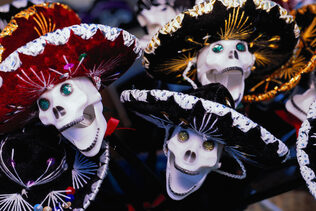
While Hallowe'en has mostly lost its original meaning, there are still places where the customs on October 31st and the following two days are truer to the original forms. In many European countries, families visit cemeteries, leaving flowers and sometimes having picnics.
In Mexico, Dia de Meurtos or Day of the Dead involves visits to graveyards to honour the dead through building altars, leaving gifts and food and drink for them. The Portugese took the Catholic customs with them to Goa in India and it is now customary on All Souls' Day for lunch to be offered to the poor. Families may also visit graveyards to decorate the graves of their lost ones.
The Phillipines also have a version of Dia de Muertos when whole families may spend a night or two at the grave, eating, drinking, singing and playing cards - generally having a party with their deceased! The relationships with their dead still live.
This is something I wrote about 17 years ago, after my Mum's death in October 1999. I recently read it again and thought I would share it here.
A Parting
Being born, it is often said, is a struggle. But the striving to grasp life at the beginning is only a forerunner of the struggle to die at the end. Although the body may have been destroyed by old age, disease or accident, the will to survive forces endurance beyond belief. Letting go of life to step into the uncharted territories beyond is a step greater than any we have ever made before, in this life at least.
To be with a loved one at the moment of their death must surely be one of the most profound experiences that anyone can ever have. Mere words cannot describe the thoughts and feelings of those present. The strife of life is passing and we cannot yet follow.
I spent four days and two nights watching my mother as she strove to die. The boys (her grandsons, aged eleven and eight years) and I left her on Tuesday evening at the nursing home, where she lived. She was tucking into a meal of meatballs and rice. Although she seemed a bit depressed, I was not unduly worried as she was eating more than she had for months.
She had been diagnosed with terminal cancer only 14 weeks before. At that time she was living independently in her 'wee hoose' around the corner from us. But not long after the diagnosis, she had a stroke which paralysed the right side of her body. Faced with her own death she had returned to her old drinking habits – she was a recovered alcoholic. From the hospital, she went to the nursing home. I was initially angry that she had started drinking again and felt as if she had robbed me of the last few weeks of her life. But quiet reflection helped me to realise that she was living the end of her life the way she wanted and I couldn't know what she was feeling. If she wanted to drink to cope, that was her choice.
When I visited her on the Wednesday morning, I struggled to accept the change. Eyes glazed and unfocused, she lay on her side, not talking, not recognising. The doctor said she may have had another stroke or perhaps the cancer had spread to her brain. I stayed until late that evening but there was no change. One of the nurses, Tammy, finished her shift and then sat with her so I knew she was not alone.
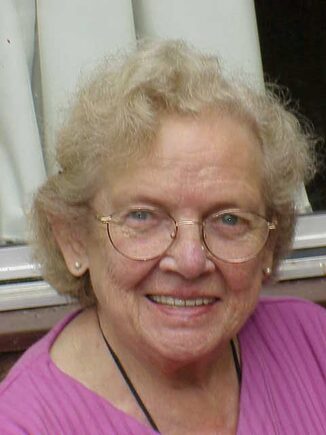 The following morning Mum was brighter, recognising people and trying to talk. Although she wasn't eating, the doctor thought she might get slightly better. This was the third time in the last few weeks that she had seemed to be in a coma and then made an almost complete recovery. I was on a rollercoaster of emotion, plunging into the reality of her death and then rising into hope as she became lucid and started to eat again.
The following morning Mum was brighter, recognising people and trying to talk. Although she wasn't eating, the doctor thought she might get slightly better. This was the third time in the last few weeks that she had seemed to be in a coma and then made an almost complete recovery. I was on a rollercoaster of emotion, plunging into the reality of her death and then rising into hope as she became lucid and started to eat again.
But that afternoon, she sank deeper away. I stayed that night, dozing in a recliner chair by the side of her bed. Every time I woke, I listened for her breathing. Reassured, I would allow myself to drift off again. The next day, Friday, brought little change. Mum only reacted when the nurses moved her, calling out my name although her wide-open eyes were unfocused. She had stopped drinking and was dehydrating. We were rarely alone as friends came to say their goodbyes and offer support. I felt as if I was in a state of limbo – I talked to people, shared stories, laughed, cried but now I struggle to remember who came. My friends, Jenny and Toni; Mum's cousin and his wife; Mum's friends, Di, Beryl and Ron. Who else? Sadly one of Mum's closest friends, Rose, was in a different nursing home. She died the same day as Mum.
I phoned Mum's sister in Scotland and held the phone to her ear so that her sister and brother-in-law could talk to her. They both wanted to be here but the distance and their own frailty prohibited this. I know Mum recognised their voices as she tried to talk but could only make noises in her throat. It seemed as if this was one of the last things I could do for Mum.
That night, my then partner (Matt) and I both stayed with her, sleeping in chairs next to her bed. On Saturday morning I was thrilled when she, propped up on pillows, started to drink, greedily sucking at the syringe of water. She seemed to know me and said very clearly, 'I remember my mother'. Later she said, 'You were very hot'. Perhaps she was recalling something from my childhood. I began to hope that she would rally but a part of me knew that this time was final and wished for it to be over.
Certain she could hear us, Matt and I spent the time talking to her and singing (although neither of us have very good singing voices). When my dad was dying I read his favourite poems to him. Mum was never that fond of poetry so we sang Burns's songs – Red, Red Rose, Auld Lang Syne, Ye Banks and Braes – and other Scottish songs like Flower of Scotland. We sang bits and pieces of hymns, fragments of songs from our childhoods. The singing gave me something to hold onto while the woman who gave me birth was slipping away.
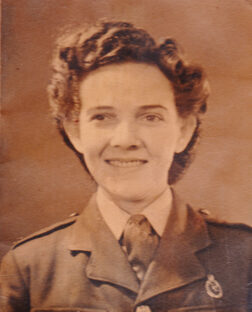
During the day, Mum's breathing grew more laboured and her hands grew colder. Eyes half open, she drifted further away from us. Late in the evening, I finished singing Flower of Scotland. The lord's My Shepherd came unbidden to my lips. I was hardly aware of what I sang and had just finished the line 'Yea though I walk through Death's dark vale' when Matt spoke my name softly. Mum's breathing had gentled to a whisper. Her eyes were now wide-open, surprised, unmoving, piercing blue surrounding the small points of her pupils.
What did those eyes see in those last moments? We both leant over her to kiss her and stroke her hair, telling her we loved her and wishing her on her way. The way that I cannot yet follow. Four or five soft breaths and then . . . I watched the pulse in her throat throb once. It was over, at least for us. For her, something had just begun. Did her soul still inhabit that broken body? Was she hovering nearby, watching and grieving like us?
I closed her eyes.
Parting is all we know of heaven,
And all we need of hell.
- Emily Dickinson
So many of the people that I see ask me if how they are feeling is normal. Our society has taught us that there is a right way to grieve and that you can get 'stuck' in stages. I always tell them there is no right or wrong way to grieve and that whatever they are experiencing is the right way for them at this point in time.
Much of Western society's beliefs about grief have been formed by the theories of Freud and of Kübler-Ross. Freud believed that the survivor had to 'let go' of the deceased in order to heal. It was considered important to 'move on' and get back to normal life as quickly as possible. This should be accomplished within a relatively short period of time. However, when Freud's own daughter died, he admitted privately that he was still mourning for her 30 years after her death. Even he was unable to completely 'move on'.
In the 1960s Elisabeth Kübler-Ross proposed that there were five distinct stages to grief - (1) shock and denial, (2) anger and guilt, (3) bargaining, (4) depression and (5) acceptance. Kübler-Ross based her influential theory on her work with terminally ill people who were facing their own deaths. It was thought to also apply to the bereaved, although there is little evidence that it does. Others built on her theory, incorporating other stages or stating that progress is not linear through the stages but rather that different stages can occur at any time. The general belief is that you can get stuck in a particular stage and that stops you from 'moving on'. Stage theories of grief can mean that mourners feel judged if they haven't reached the 'appropriate' stage within a certain time frame. They hinder, rather than help, healing.
Thankfully, these theories are now being discarded and it is being recognized that grief is a very individual process and that feeling connected with the deceased (if that's right for you) can help us to heal and find a new normal.
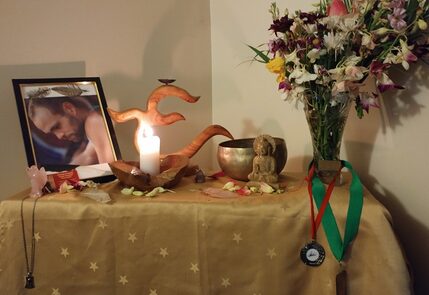
While most people won't need professional help, there are factors which can complicate the grieving process. For example, if the death was a child, a suicide or violent or if the body was never recovered, then survivors may benefit from talking to a counsellor.
Personally, I still keep a lit candle and fresh flowers next to a photo of my son. It has been seven months since he took his own life. As he followed Buddhism, the table also includes a small Buddha, his Tibetan singing bowl as well as his kayaking medals. In some Buddhist traditions, when the death is a suicide, a shrine must be kept for 12 months after. I do this to honour my son and his beliefs. But as I light the candle in the morning or blow it out in the evening, I talk to him. I like to think he hears me and knows he is loved.
We all die yet many of us are uncomfortable with the idea of dying and unsure of what to do or say when we find out a loved one is dying. For many of us, that will be a parent but for others it may be a partner or, perhaps hardest of all, a child.
If you are preparing yourself and others for the death of a loved one, it is beneficial to have a network of caring people around you who can help you when the time comes. These should be people who are able to talk about death comfortably or who have been through a similar experience. No matter how expected a death, that final moment brings fresh shock and grief and it is important to take care of yourself.
Sometimes the people you think will be there for you are not. This could be because they feel awkward with death, or because they don't know what to say or do. I remember feeling hurt when my son died and somebody whom I counted as one of my closest and oldest friends didn't contact me for a week, although she was one of the first people that I sent a message to from the hospital.
On the other hand, people that I had only known for a short time took time off work to support me or cooked meals for me during those first weeks.

If you have been a full-time carer of an elderly or disabled person, it may be that friendships have lapsed. Reach out to old friends and let them know what has been happening. Tell them that you will need support in the coming weeks. I know that, in our society where a high value is placed on being self-sufficient, this can be hard to do but most people will be pleased that you have contacted them again. There are also many online groups that offer support. Sometimes it's easier to chat with a stranger who has had a similar experience to you!
Often people want to help but don't know what to do. This is the time for you to voice what you need. Perhaps a friend can help to organize others. Create a list of things you need and want for both before and after your loved one's passing. This could include things like mowing the lawn, housework, laundry, meals, shopping, walking the dog. Many years ago, I used to have a pet care business, looking after pets at their homes while their owners were away. My mum was dying of cancer and, when it was clear that she had only a very short time to live, I asked a neighbour to help me with my jobs so that I could spend more time with mum. 18 years later, my neighbour still talks about how much fun she had filling in for me. Give people the opportunity to show how much they care by asking!
Recently I was talking with a friend about how she remembered her son on special occasions. She told me that on his birthday, the family held a family dinner with a birthday cake for him and at Christmas they laid a place for him at the table.
Another friend still hangs a Christmas stocking for her daughter. Somebody else I know gives a gift to charity from her deceased mother every Christmas.
Some people may think that this is all a bit strange. They might even think that people who do this have not 'let go' and are hanging on to their grief. There can be some judgmental thoughts about this kind of remembrance.
The truth is that whatever works for you is the right thing to do for you. Some people prefer not to remember - they can only get through those days by not thinking about their loss. Again, this is fine.
First occasions are often hard so it is important to think about what you want to do and how you want to deal with things. You may want to completely break with your traditions and do something new or you may want to carry on with your familiar rituals.
My son passed a week before Christmas. On Christmas Eve, we watched one of his favourite comedy movies and toasted him with his favourite whisky.We laughed at the jokes and talked about how much he loved that film. We spoke as if he were in the room with us. On Christmas Day, we didn't have our usual meal but went to a friend's instead. That family had also lost a son some years before and our boys had gone to school together so we shared stories and remembered. That made my emptiness easier to bear and I'm grateful to my friend for including us.
It does help to plan ahead. Think about what you are going to do for that special occasion. Honour the emptiness that your loved one has left with their passing. Give yourself, and others, the space to feel and do whatever they need to.
Have you ever read the poem 'The Dash' by Linda Ellis? If you haven't, you can find it here. Whenever I read it, I think of how little information is given on gravestones and memorials - sometimes only the dates, perhaps a quotation or a brief epitaph but little to give a sense of the person who lived.
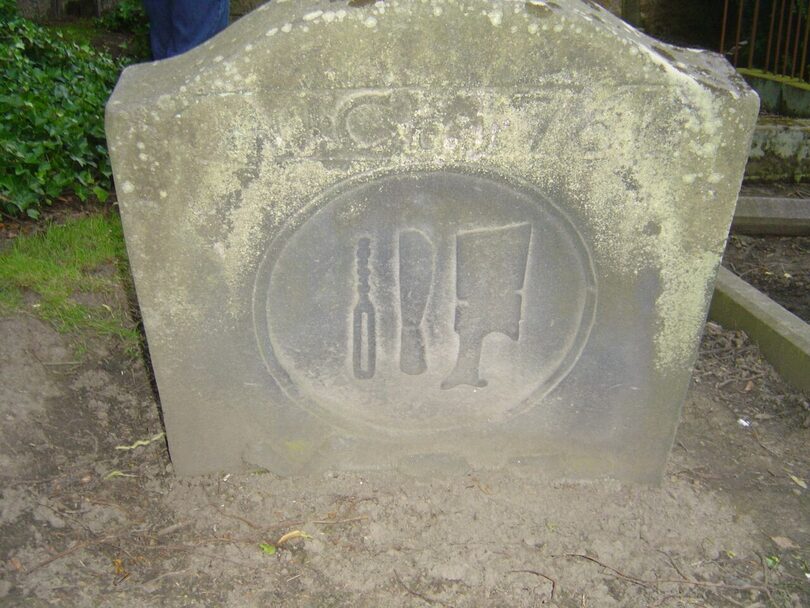
In the 17th century in Scotland, gravestones were often engraved with symbols that marked the deceased's profession. This gravestone shows the markings for a flesher or butcher. Perhaps, not much more information but at least the villagers, most of whom were illiterate, would be able to find the grave!
So, how do you want to be remembered? If you could describe yourself with a picture, what would it be?
